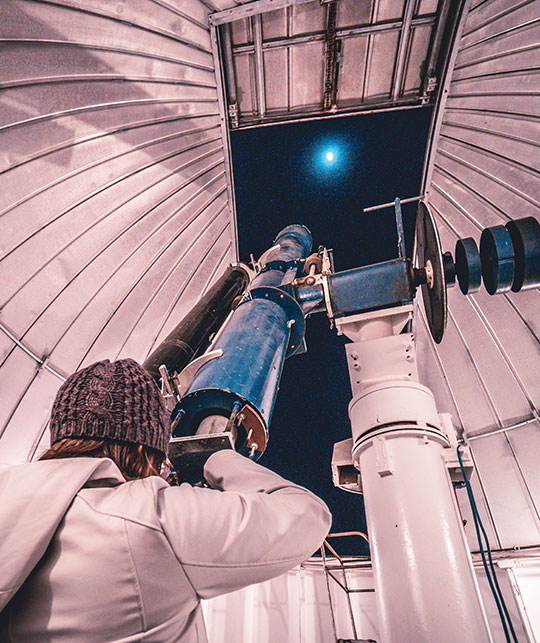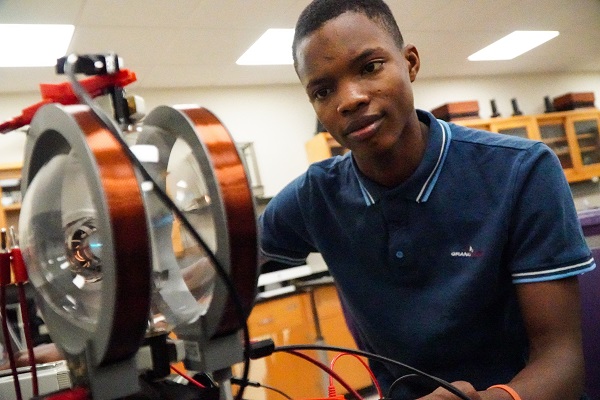
Physics (BA)
Explore the Universe & the Physical Interactions of Everything in it
If you love learning about the world around you through exploration of the fundamentals while applying quantitative reasoning to understand them, the Physics BA major is for you. We offer several concentrations in the curriculum -- including General, Solid-State, Astrophysics (plus an Astrophysics BS), Mechanical, and Theoretical -- giving you the opportunity to create a plan of study unique to your educational and career interests.
All courses in section A below taken as part of the Physics major must be passed with a grade of
C or better; transferred courses must have approval from the Division of Physics and Astronomy
to receive major credit.
- PHYS125 Physics I (4 credits)
- PHYS126 Physics II (4 credits)
- PHYS3xx (proposed) Mathematical Methods in Physics (3 credits)
- PHYS325 Elementary Optics (3 credits)
- PHYS326 Elementary Modern Physics (3 credits)
- PHYS341 Advanced Physics Lab (2 credits)
Choose three of the following four courses:
- PHYS401 Quantum Mechanics I (3 credits)
- PHYS421 Statistical Mechanics (4 credits)
- PHYS423 Classical Mechanics (4 credits)
- PHYS424 Advanced Electricity and Magnetism I (3 credits)
Completion of one of the concentrations below (minimum 8 credits, see below for details):
- Astrophysics
- Mechanical Systems
- Solid State Physics
- Theoretical Physics
- General Physics
B. Prerequisite Courses: All must be taken (12 credits)
- MATH151 Calculus I (4 credits)
- MATH152 Calculus II (4 credits)
- MATH253 Calculus III (4 credits)
C. College, University, and Elective Requirements:
- University Requirements (8 credits)
- Wellness, Physical Education, Global Perspectives, Common Ground
- CLAS General Education Requirements (40 credits)
- Ten additional courses (I, I, II, II, A, B, C, D, E, E) (40 credits) one of which meets the First Year Experience (FYE) requirement
- Free electives to meet the college total of 124 total credits (26-27 credits)
Note: Prerequisite course MATH151 satisfies the Quantitative Reasoning requirement (III) and
PHYS125 and PHYS126 satisfy the Natural Science requirement (F)
The concentrations below require a minimum of 8 credits taken from the listed courses:
Astrophysics: This concentration makes use of the University's considerable astronomy
resources through the Stull Observatory and our astronomy minor.
- ASTR302 Planetary Science (2 credits)
- ASTR303 Stellar Astronomy (3 credits)
- ASTR304 Galactic Astronomy and Cosmology (4 credits)
- ASTR307 Advanced Astronomy Laboratory (2 credits)
Solid State Physics: This concentration takes advantage of the materials-related offerings of the
Inamori School of Engineering in the NYS College of Ceramics. Students interested in earning
two degrees (a BA in Physics and a BS in Materials Science and Engineering, Ceramic
Engineering, or Glass Science) will find this option most attractive.
- CEMS344 Properties II: Electrical, Magnetic, and Optical (4 credits)
- CEMS347 Spectroscopy (2 credits)
- CEMS349 X-ray Characterization (2 credits)
- CEMS501* Solid State Physics (3 credits)
- PHYS408 Physics of Glass (4 Credits)
Note: seniors in good standing may, with permission of instructor, take a 500-level graduate
course.
Mechanical Systems: This concentration includes the offerings in fluid mechanics,
thermodynamics, and vibrating systems of AU's Mechanical Engineering program. It is
particularly appropriate for students seeking both a BA in physics and a BS in Mechanical
Engineering.
- MECH321 Thermodynamics II (3 credits)
- MECH324 Fluid Mechanics I (3 credits)
- MECH415 Mechanical Vibrations I (3 credits)
- MECH424 Fluid Mechanics II (3 credits)
Theoretical Physics: This concentration allows greater depth in students' physics preparation.
- PHYS402 Quantum Mechanics II (3 credits)
- PHYS405 General Relativity (4 credits)
- PHYS410 Particle Physics (4 credits)
- PHYS454 Electricity and Magnetism II (3 credits)
General Physics: This concentration allows greater breadth in students' physics preparation.
- Choose a minimum of 8 credits from the courses listed in any of the concentrations
above, with no more than 4 credits from any one concentration.
In addition to fulfilling the requirements of the Physics BA major, as well as the College of Liberal Arts & Sciences general education requirements, you'll be required to complete the College's First Year Experience Program or Transfer Student Program.
Unlike the primary major, the Physics double major does not require a concentration. Instead, the double major requires 8 credits of electives from a single list of courses covering all those in the concentrations. This structure gives students greater flexibility in choice of electives and is more relevant in the context of a double major.
The Physics double major may not be combined with the BA in Physics, the BS in Physics, or the BS in Astrophysics due to extensive overlap.
All courses in sections A and B below taken as part of the Physics major must be passed with a
grade of C or better; transferred courses must have approval from the Division of Physics and
Astronomy to receive major credit.
LEARN MORE ABOUT DOUBLE MAJORS
A. Physics Courses: (29-30 credits)
- PHYS 125 Physics I
- PHYS 126 Physics II
- PHYS 324 Mathematical Methods in Physics
- PHYS 325 Elementary Optics
- PHYS 326 Elementary Modern Physics
- PHYS 341 Advanced Physics Lab
- PHYS 401 Quantum Mechanics I
- PHYS 421 Statistical Mechanics
- PHYS 423 Classical Mechanics
- PHYS 424 Advanced Electricity and Magnetism I
B. Electives: (8 credits) Choose a minimum of 8 credits from the following:
- Upper Level (3xx or 4xx) Physics courses not required above
- Upper Level (3xx or 4xx) Astronomy courses
- CEMS 344* Properties II: Electrical, Magnetic, and Optical
- CEMS 347* Spectroscopy (2 credits)
or CEMS 349* X-ray Characterization - CEMS 501** Solid State Physics
- MECH 321* Thermodynamics II
- MECH 324* Fluid Mechanics I
- MECH 415* Mechanical Vibrations I
C. Prerequisite Courses: All must be taken (12 credits)
- MATH 151 Calculus I
- MATH 152 Calculus II
- MATH 253 Calculus III
* These courses have prerequisites outside of the Division of Physics and Astronomy.
** Undergraduates in good standing may request permission to take graduate courses.
Physics Minor:
PHYS 125 Physics IPHYS 126 Physics II
PHYS 325 Elementary Optics
PHYS 326 Elementary Modern Physics
8 hours of 300 and/or 400 level courses in physics (4 hours may be taken in astronomy).
*Note: Since 300 and 400 level physics courses are only offered in alternate years, be careful scheduling.
A degree in Physics prepares students for a wide range of careers. According to the Institute of Physics, about one third of all physicists work in public service industries, one third in private industry, and one third in secondary and higher education. Physics graduates are qualified to work in career fields such as astronomy, medicine, engineering, research, computing, and even finance.
Recent examples include:
- Teaching Assistant – University of Toledo
- Measurements Engineer – Corning Incorporated
- Toxicologist – New York Hospital
- Engineer – EMS Technologies
- Engineer – Mercury Corporation
Student Stories
News
Similar Programs
Majoring in the Physics BA program but considering more specialized career options after graduation? The Physics BS program or adding a minor to your plan of study may be a great idea for you.




